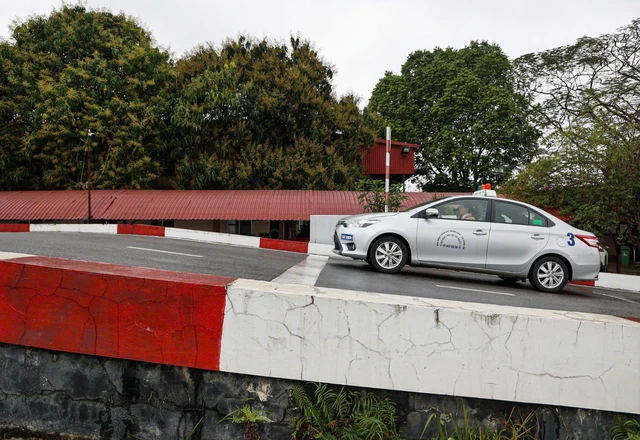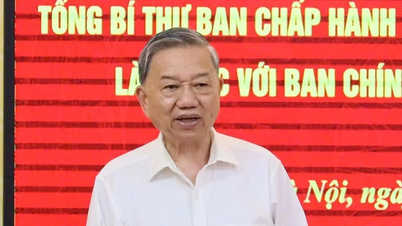From June 1, 2025, the Traffic Police Department - Ministry of Public Security officially applies a new set of theoretical questions in the national road motor vehicle driving license (GPLX) examination. This is an important transition from the Ministry of Transport to the Ministry of Public Security in the management of training, testing and issuance of driving licenses.
Not only changing the organizing unit, the new set of questions is also comprehensively improved in content and structure to improve output quality, and at the same time put an end to the situation of coping and trick learning that has lasted for many years.
Accordingly, the set of 600 questions is clearly divided into chapters, covering all the necessary knowledge for road motor vehicle drivers. The content does not stop at traffic laws, signs or driving techniques but also adds many practical situational questions and hazard handling skills - an important improvement to assess real capacity instead of just testing mechanical theory. This means that candidates cannot continue to 'learn by rote' or 'learn tricks' as before but must truly understand and apply knowledge in practice.
From June 1st, a new set of theoretical questions will be officially applied in the driving license exam - Photo 2.
Traffic police in many localities have begun organizing driving tests and issuing driving licenses.
The test set also includes a group of 'failure points' questions related to serious dangerous behaviors such as running red lights, driving under the influence of alcohol, driving in the wrong direction, not obeying traffic police orders, etc. Answering any of the 'failure points' questions incorrectly will result in an immediate failure, regardless of the total number of correct answers. This is a factor that requires candidates to study carefully, have a firm grasp of the law, and not be subjective or take any part of the test lightly.
The exam structure is also clearly defined depending on each license level. Levels A1, A2 and B1 automatic have 25 questions, candidates must answer at least 21 questions correctly and not make mistakes in the zero-point questions. Levels B1 and B2 have 35 questions, requiring at least 32 correct answers with the condition of zero-point questions. Levels C, D, E, F have 40 questions, candidates must answer at least 37 questions correctly and not make mistakes in the zero-point questions. The test time is still maintained from 15 to 20 minutes depending on the level.
This innovation means that candidates must completely change the traditional way of studying. Learning by trick, rote learning or simply reviewing theory will no longer be effective and can even lead to failure due to incorrect questions or not understanding real-life situations. Candidates need to focus on comprehensive review, focusing on practicing situational questions and skills to handle danger.
Candidates for the driving license test should be aware that this is not a procedural exam. Having a firm grasp of the law and knowing how to handle situations not only protects yourself but also those around you.
The application of the new set of exam questions is not only a change in testing techniques but also demonstrates the determination of the police force in raising awareness and responsibility of drivers right from the start. In the context of traffic accidents still facing many challenges, the driving test becomes an important screening step, ensuring that drivers not only know how to drive but also truly understand and comply with traffic laws, contributing to protecting the safety of themselves and the community.
The Traffic Police Department also recommends that candidates should not just memorize or memorize trick questions, but should focus on understanding the nature of the law and applying it flexibly. For example, with the group of zero-point questions such as running a red light or driving under the influence of alcohol, understanding the fine, the risk of accidents and the legal consequences will help candidates remember more deeply instead of just memorizing the answers mechanically.
In addition, the Department also emphasizes the importance of practicing real-life situations in the exam. Candidates should use the official mock exam software released by the Department, where situational questions are simulated closely to reality, helping candidates practice their skills in handling and making decisions quickly and accurately. This practice is completely different from traditional theory learning, requiring candidates to actively think instead of memorizing.
Source: suckhoedoisong
Source: https://baotayninh.vn/tu-1-6-chinh-thuc-ap-dung-bo-de-ly-thuet-moi-trong-ky-thi-sat-hach-cap-giay-phep-lai-xe-a190565.html



![[Photo] Prime Minister Pham Minh Chinh receives a bipartisan delegation of US House of Representatives](https://vphoto.vietnam.vn/thumb/1200x675/vietnam/resource/IMAGE/2025/5/28/468e61546b664d3f98dc75f6a3c2c880)

![[Photo] 12th grade students say goodbye at the closing ceremony, preparing to embark on a new journey](https://vphoto.vietnam.vn/thumb/1200x675/vietnam/resource/IMAGE/2025/5/28/42ac3d300d214e7b8db4a03feeed3f6a)
![[Photo] General Secretary To Lam works with the Central Policy and Strategy Committee](https://vphoto.vietnam.vn/thumb/1200x675/vietnam/resource/IMAGE/2025/5/28/7b31a656d8a148d4b7e7ca66463a6894)

![[Photo] Vietnamese and Hungarian leaders attend the opening of the exhibition by photographer Bozoky Dezso](https://vphoto.vietnam.vn/thumb/1200x675/vietnam/resource/IMAGE/2025/5/28/b478be84f13042aebc74e077c4756e4b)


















































































Comment (0)